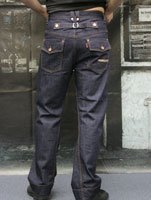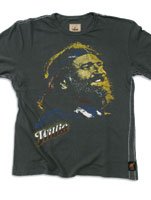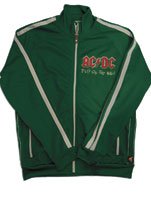Fashion Takes Music-Inspired Clothes Beyond the T-Shirt
Sales of music CDs have been slipping for the past few years, but from the point of view of the fashion industry, the music business has never looked better.
An increasing number of contemporary and premium denim labels have been licensing names of musicians, and even legendary nightclubs, to make their brands stand out in a crowded marketplace.
The MAGIC International trade show has taken note of the growing fashion obsession with music. This year, MAGIC is debuting the MySpace Showcase pavilion, dedicated to more than 20 emerging brands inspired by music, at the Las Vegas Convention Center.
MAGIC is also hosting more than 17 exhibitors selling music celebrity lines, mostly established hip-hop lines such as Apple Bottoms from Nelly and Phat Farm from Russell Simmons and Kimora Lee Simmons.
Business has been peaking for apparel labels that have successfully turned what was once an industry dominated by lowcost, boxy concert T-shirts into contemporary casualwear with retail price points fetching more than $100.
Fashion T-shirts bearing the logos of classic rock bands have been particularly popular, said Fraser Ross, owner of Kitson, an influential retailer on Los Angeles’ trendy Robertson Boulevard. “It’s like printing money. It’s guaranteed sales,” he said.
Kitson has been experiencing increasing success with Los Angeles–based Junk Food’s rock T-shirts, which display the names of classic bands such as Rolling Stones and The Beatles. These shirts sell for $48.
Music-related items also sell well at higher price points, Ross added.
Kitson sells Rolling Stones T-shirts made by London-based resource Buddhist Punk, which retail from $125 to $200. The retailer also is experiencing success with contemporary lines such as Catch A Fire by designer Cedella Marley, who often uses images of her late father, reggae legend Bob Marley, on her clothes.
Fashion vs. fame
While many of these fashion labels trade on the name recognition of their license, they stake their continued success on their designs, said Karen Greenberg, vice president of Catch A Fire.
T-shirts account for about 60 percent of the New York–based line. But 40 percent is composed of contemporary fashions, including silk camisole tops, bohemian skirts and tweed jackets that are sold at retailers such as Tryst and Dari in Studio City, Calif. According to Greenberg, sales have tripled in the past year.
The brand is garnering cachet as a contemporary line through its blazers and camisole tops. But it was the musician’s fame that helped the company get its proverbial foot in the door. “People feel strongly about Bob Marley. It’s good name recognition,” Greenberg said.
Southern California companies Defiance USA Ltd., based in Los Angeles, and Wor International, based in Irwindale, Calif., also plan on making a similar journey. They have licensed gold-standard names in the annals of rock history— Fender and the New York nightclub CBGB, respectively—to make premium denim.
Executives at the companies hope the brand names will appeal to successful, fashionable men and women who grew up listening to the sounds of Fender guitars or buying records of the bands who played at CBGB. But brand representatives said they also hope the lines experience popularity because of their fashion savvy.
Authentic experience
Despite the success of established contemporary brands such as Sean John, run by hip-hop mogul Sean “P. Diddy” Combs, retail analyst Liz Pierce of the Los Angeles office of the Sanders Morris Harris Group Inc. said she questions whether trends popular in music-obsessed circles will cross over with people who do not count themselves as rock or hip-hop fans. “Music has always been part of fashion, but there hasn’t been a dominant trend out of the music industry that has translated into apparel,” Pierce said.
Furthermore, the most visible rock apparel retailer, Hot Topic, has reported poor sales in the past year with rock-inspired apparel that falls outside of its strong music T-shirt business. The company’s net income in fiscal 2005 slipped to $39.7 million from $48 million in fiscal 2004. Only one Hot Topic brand, Glitterboy, manufactured by Los Angeles–based Serious Clothing, was specifically licensed from a rock star, however.
The best strategy to keep music-based fashions popular with fans is to find a way to distill the authentic experience of classic bands through fashion, according to Brad Beckerman, designer and chief executive of the apparel label Trunk Ltd., based in Los Angeles. Trunk is projected to earn $9 million in gross sales this year, triple its 2004 earnings, Beckerman said.
Since Thanksgiving weekend 2002, Trunk has been shipping slim-fit T-shirts bearing the logos of classic bands such as The Beatles, Rolling Stones, Pink Floyd and The Doors. The T-shirts feature idiosyncratic stitching on the seams and a patch bearing the elephant logo of the company. Trunk manufactures the T-shirts in limited runs of 250 to 1,000.
According to Beckerman, the exclusivity of the shirts appeals to the fashion crowd. Good relations with musicians, band managers and caretakers of musicians’ estates keep the feel of the clothes authentic, he said.
“People want to buy into authenticity; they don’t want to buy a knockoff,” Beckerman explained. “Bands trust me because we put out a great product that tells more about who they are. It’s more than slapping a logo on a key chain.”
The quality of licensed products is crucial to musicians, according to Beckerman, because once the first memories of the musician’s glory days fade, licensed products are frequently the most visible representation of the artist.
Beckerman counts on longevity because the classic bands on Trunk’s T-shirts have proved to be evergreen in popularity. He also debuted a contemporary expansion of the line, specifically jackets and belts, at the Coterie trade show in New York last April. The first shipment will be in October.
The appeal of music-inspired fashion could remain strong, according to pollsters researching the attitudes of teen-agers. While music industry executives have fretted that the growing popularity of electronic games might cut into their entertainment market share, Northbrook, Ill.–based Teenage Research Unlimited thinks otherwise. It reported that teens are as obsessed with music as their baby-boomer parents. “Music is pervasive, but it’s not something they’re always interested in paying for,” said Rob Callender, the company’s trends director.
The good news for apparel companies is that the obsession crosses over to fashion, according to the ICR Survey, based in Media, Pa. “Teen-agers still cite music, musicians and actors as a major influence in their fashion choices,” said Michael Brenner, a survey spokesperson.
























